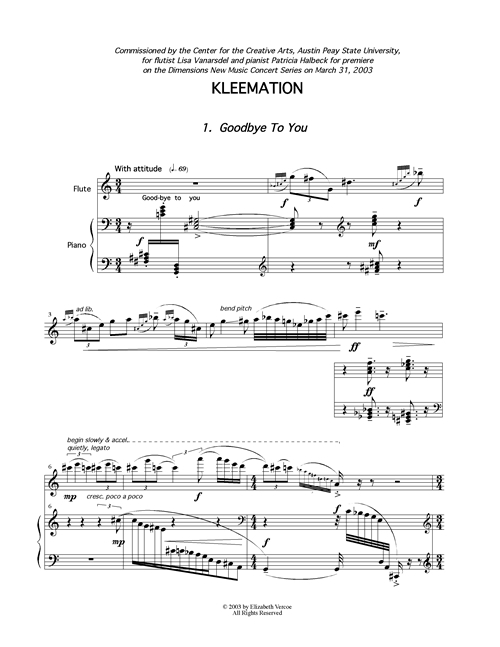Kleemation
for flute and piano (2003)
Navona CD #5884 & iTunes
Noteworthy Sheet Music, 17 minutes
“highly abstract yet accessible” (WRUV Reviews)
“Vercoe musically renders Klee’s drawings with all the humor, fear, and reality
that make each one leap from its canvas…” (IAWM Journal))
“The music and musicianship live up to the master.” (Samuel Jay Keyser)
Kleemation for flute and piano is in five short movements based on five drawings by Paul Klee titled: Goodbye to You, Please!, Afraid on the Beach, More Will Be Marching Soon, and Woman Sowing Weeds. The music was written on commission for flutist Lisa Vanarsdel and pianist Patricia Halbeck while the composer held the Acuff Chair of Excellence in the Creative Arts at Austin Peay State University in Tennessee. Kleemation received its premiere at the university on the Dimensions New Music concert series in 2003. It was first performed in New England in 2004 by “2” with flutist Peter H. Bloom and pianist Mary Jane Rupert at the Duxbury Art Museum in Duxbury, Massachusetts. Subsequently, “2” has performed the piece many times on tours in the U.S., Thailand, Australia and New Zealand.
Program Notes:
The first short movement, “Goodbye To You,” incorporates the title into the rhythm of the music, both in the opening piano phrase and toward the end. This is a goodbye said in a matter of seconds and viewed later with a certain wry humor.
“Please!” draws on the vernacular tradition of a kind of swing music with striding bass line and laid-back melodic line, but the music becomes more strident and complex before it reverts to a more tense version of the easy-going opening.
“Afraid on the Beach” is the longest of the five, with a flowing piano part intended to evoke the relentless pounding of waves with a soaring flute line high above. There are two breaks for quiet and reflection and a final return to the beginning music.
“More Will Be Marching Soon” incorporates the hymn Onward Christian Soldiers into the flute and piano parts, reflecting the anxiety of both Klee’s situation in Germany as a member of the Bauhaus School (which was eventually closed down by the Nazis) and our own uncertain times.
The “Woman Sowing Weeds” is probably subversive, scattering weeds instead of flower or vegetable seeds. Whatever her intent, her action is sure. The flickering flute gestures are like the flicks of the scattering hand over a staccato piano raining down tiny seeds.

